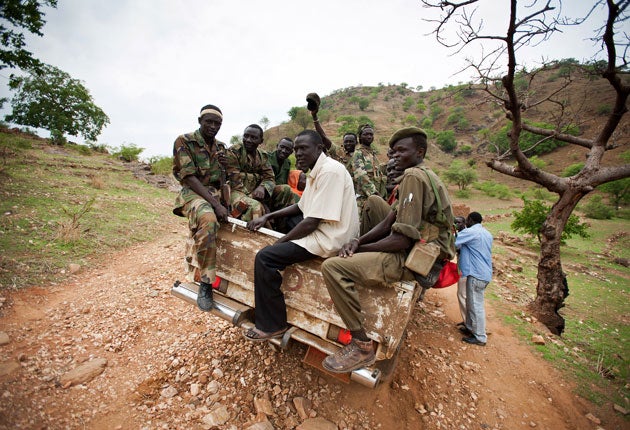We are ready to take Khartoum, say militias allied to South Sudan

Your support helps us to tell the story
From reproductive rights to climate change to Big Tech, The Independent is on the ground when the story is developing. Whether it's investigating the financials of Elon Musk's pro-Trump PAC or producing our latest documentary, 'The A Word', which shines a light on the American women fighting for reproductive rights, we know how important it is to parse out the facts from the messaging.
At such a critical moment in US history, we need reporters on the ground. Your donation allows us to keep sending journalists to speak to both sides of the story.
The Independent is trusted by Americans across the entire political spectrum. And unlike many other quality news outlets, we choose not to lock Americans out of our reporting and analysis with paywalls. We believe quality journalism should be available to everyone, paid for by those who can afford it.
Your support makes all the difference.A day after losing one-third of its territory to the newly independent South Sudan, the government of Omar al-Bashir is facing a new threat from rebels in the Nuba Mountains who have vowed to "march on Khartoum".
After fighting off government forces that last month tried to disarm them in violation of international agreements, rebel leaders said yesterday that they were close to recapturing Kadugli, the capital of Sudan's oil-rich Southern Kordofan state. "First we take Kadugli, then [the garrison town] El-Obeid, then Khartoum," said Brigadier Said Ketchum, one of the leaders of the resistance which this weekend declared self-rule in the Nuba Mountains.
Across the natural fortress in the rocky hills, Nuban militias are being mobilised and northern forces have had to retreat into garrison towns. The Independent has been shown heavy weapons and vehicles captured from retreating government forces near the frontline village of El-Hamra.
President Bashir, who attended South Sudan's independence party in the new capital, Juba, on Saturday, recognised the South's right to break away after decades of civil war but has taken a tougher line with rebels in the North. He accused the Nuba rebels – who, like their civil-war allies in the south, call themselves the SPLA – of betrayal and talks to end the month-long conflict have broken down. Some 73,000 civilians have fled the fighting. A bombing campaign by Khartoum has killed hundreds hiding in the mountains.
President Bashir, who is wanted for war crimes by the International Criminal Court [ICC], is facing a string of internal rebellions stretching from Blue Nile state in the east to the restive western region of Darfur.
The borders and share of oil revenues between the two Sudans have not been finalised, with each side giving warning that it will cut the other's oil supplies if it is unhappy with the outcome of talks.
The rising cost of fuel and food has spurred protests and arrests in Khartoum. Rebels in Darfur, who have previously advanced to the outskirts of the capital, are also reported to be contemplating a new offensive.
As the division of what was Africa's largest country approached, Khartoum reportedly rigged a local election and placed Ahmed Haroun – also wanted by the ICC for crimes in Darfur – as governor of South Kordofan. The government has made repeated attempts to assassinate the Nuban leader Abdel Aziz al-Hilu, widely seen as the real winner in the governor's race. Mr Haroun raised Arab militias and deployed government forces who last month attempted to disarm and arrest Nuban members of the armed forces and political opponents of Khartoum.
Witnesses in Kadugli said civilians were murdered directly outside the UN peacekeeping base in the town.
Since escaping an assault on his house in Kadugli last month, Mr Abdel Aziz has led SPLA operations from a hideout in the Nuba Mountains. Some analysts believe he is trying to unite northern Sudan's fractious rebel movements into a combined force that would seriously threaten Mr Bashir's ruling NCP party.
South Sudan has so far backed away from fighting in the border area but new President Salva Kiir issued a coded warning to Khartoum on Saturday: "I want to assure the people of Abyei, Darfur, Blue Nile and South Kordofan that we have not forgotten you... When you bleed, we bleed."
Join our commenting forum
Join thought-provoking conversations, follow other Independent readers and see their replies
Comments